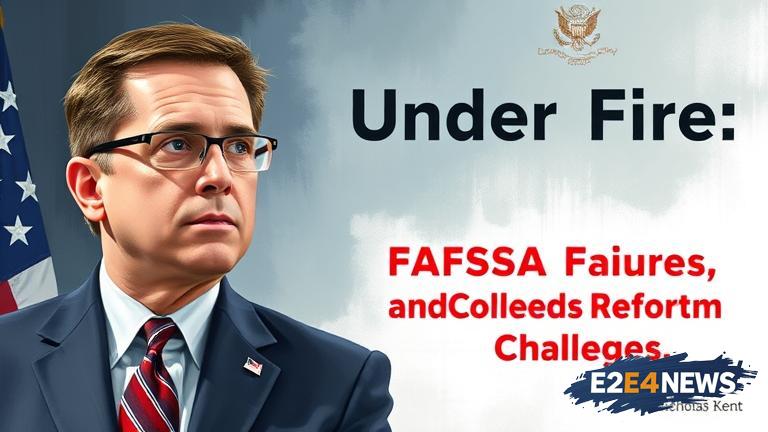The newly appointed US Under Secretary of Education, Nicholas Kent, is facing intense scrutiny over the recent failures of the Free Application for Federal Student Aid (FAFSA) system. The FAFSA is a critical tool for students seeking financial aid for college, and its malfunction has left many without access to essential funding. As a result, Kent is under pressure to reform the system and ensure that it is functioning properly. The FAFSA failures have sparked widespread concern among students, parents, and educators, who are calling for immediate action to address the issue. The problems with the FAFSA system are just one of the many challenges facing Kent, who has also been tasked with implementing comprehensive college reform. The reform efforts aim to make higher education more affordable and accessible to all Americans, regardless of their background or financial situation. However, the process has been slow, and many are questioning the effectiveness of the current approach. Kent has promised to work tirelessly to address the FAFSA failures and implement meaningful reform, but it remains to be seen whether he will be able to deliver on his promises. The FAFSA system is used by millions of students each year, and its failure has caused significant disruption to the college application process. Many students are struggling to access the financial aid they need, and some are even being forced to delay their education as a result. The situation has sparked a heated debate about the state of higher education in America, with many calling for a complete overhaul of the system. Kent has acknowledged the problems with the FAFSA system and has pledged to work with lawmakers and educators to find a solution. However, the process is likely to be complex and time-consuming, and it may take several months or even years to fully address the issue. In the meantime, students and families are being forced to navigate a difficult and often confusing system, which can be overwhelming and frustrating. The FAFSA failures have also raised questions about the effectiveness of the US Department of Education, which is responsible for overseeing the system. Some have criticized the department for its handling of the situation, arguing that it has been slow to respond to the crisis. Kent has defended the department’s actions, saying that it is working hard to address the issue and prevent similar problems from occurring in the future. Despite the challenges, Kent remains committed to his goals of making higher education more affordable and accessible. He has proposed a range of reforms, including simplifying the FAFSA application process and increasing funding for low-income students. However, the proposals have been met with skepticism by some, who argue that they do not go far enough to address the underlying problems with the system. The debate over college reform is likely to continue in the coming months, with Kent and other lawmakers playing a key role in shaping the future of higher education in America. As the situation continues to unfold, one thing is clear: the FAFSA failures and college reform challenges will be a major test of Kent’s leadership and his ability to deliver on his promises. The US Department of Education has a critical role to play in addressing the issue, and it will be important for Kent to work closely with lawmakers, educators, and other stakeholders to find a solution. The future of higher education in America hangs in the balance, and it is essential that Kent and other leaders take bold action to address the challenges facing the system. The FAFSA failures are just one symptom of a broader problem, and it will take a comprehensive and sustained effort to create a more equitable and accessible system of higher education. Kent has a unique opportunity to make a positive impact on the lives of millions of Americans, and it is essential that he seizes this chance to create meaningful change.
